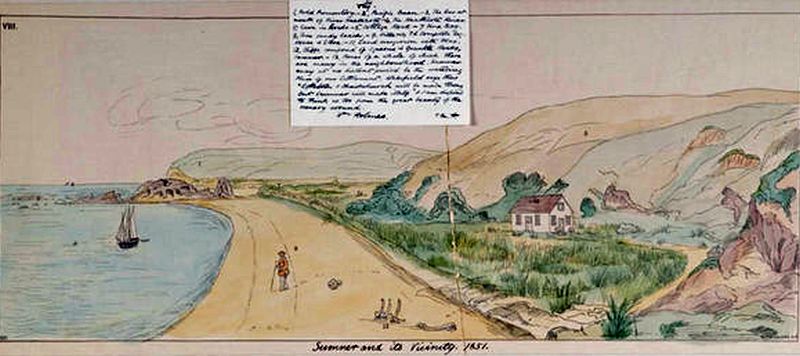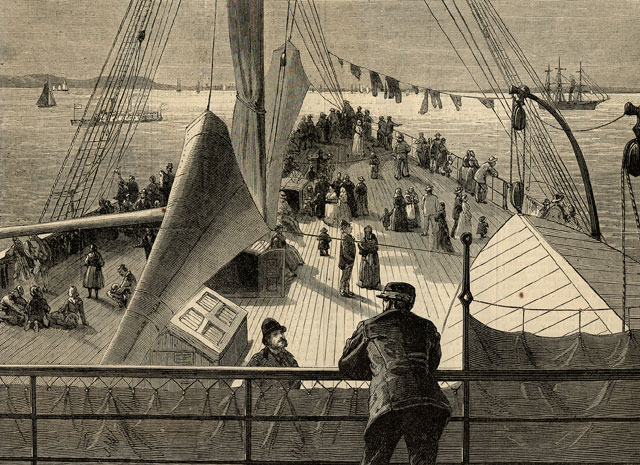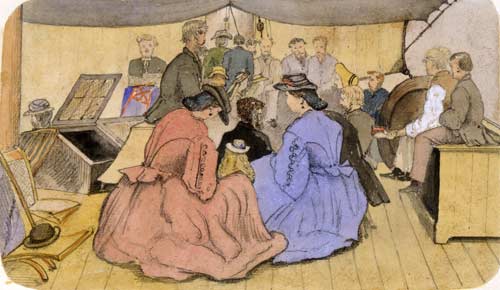
|
Church service at
sea...On Sunday mornings all the passengers
would have dressed in their best clothes and assembled on deck for
their church service. The service would have been taken by the Rev Jackson. There
was sure to have been a choir of young ladies to lead the singing.
The captain likely made a practice each Sunday of writing, the ship�s position on a blackboard at noon so the passengers
could see the progress of the past week.
The daily main meal always at midday, was cooked in a common pot.
Each mess had a numbered wooden or metal token attached for
identification to its particular lump of meat and also to its net of
preserved potatoes, a plum duff of boiled rice which was
pudding. The evening meal consisted of biscuit and butter with tea
to drink and since there was seldom any shortage at the midday meal,
there were cold leftover meats for tea. The meals were monotonous -
porridge every morning, 2 days they had salt beef and boiled rice
and 3 days pork and pea soup, and 2 days of preserved meat and
preserved potatoes The most common complaint concerned bread - it
was either stale or when freshly baked on board, sour and of poor
quality. The rough seas had everything on the table sliding and
caused unexpected variations to the menu when the weekly provisions
would get all mixed together, such as salt, tea, coffee and treacle!
The second cabin was treated in the same way as the steerage but the
fortunate inhabitants of the first class cabin had a good deal of
fresh food shipped to them at the beginning of the voyage and
often had a milch cow. They had the luxury of their meals cooked by
a steward. The narrow decks were cumbered with a pen of
squealing pigs and sheep and an array of poultry hutches.
Occasionally this livestock was killed and consumed on board and was
supplemented by a pedigree lamb or bull or one or two valuable dogs
which passengers were bringing out for use on their
farms. |
Mon: Nov 25, 1850: Strong breeze and squally -
going 11 knots. The handcuffs have been removed from the prisoner with the
promise to the Captain that he would behave properly in future, so he was
released from confinement.
Tue: Nov 26, 1850: Latitude 31 degrees 50". Cold
and very squally with rain. 11 1/2 knots. The wind has increased in fury
and the ship was knocked about - to use a sailor's term "like
blazes." The sailors were obliged to take in most of the sails in the
teeth of the gale. When the rain ceased, the sun shone for a few minutes
at noon, the sextant obligingly showed and then again the storm continued
to rage the rest of the day. The waves rose mountains high, with the wind
howling dismally in the rigging. On goes our gallant ship, bowing to the
storm. Her timbers shiver and creak, but are held safe and sound
throughout the raging of the elements. Night fell with an inky blackness
and those among us who retired early, lay nervously listening to the
deafening roar of the wind and waves and only a few slept soundly.
Wed: Nov 27, 1850: Latitude 34 degrees 21 ", long.
14 degrees west. Beautiful weather - it has changed completely. The sun
shines brightly and what sight could be more beautiful, on this bright
sunny morning, than our proud ship, with her snow white sails outspread,
at 3 knots, skimming gracefully along over foam tipped waves - a rival to
the snowy-clad gulls - and seemingly as buoyant. The fresh cool air is
exhilarating and how health giving the steady breeze. How fair and sweet
Nature appears with her cloudless blue skies, which are reflected as in a
mirror by the heaving ocean - every wavelet to the east tipped with gold
by the glowing sun. All passengers felt in harmony with the magnificent
and peaceful scene; and bursts of song arose from many a tuneful throat,
from the sailors who pull merrily on the ropes to the passengers who
loiter or pace the deck to enjoy the morning's beauty. Presently the wind
fell. The day grew warmer. By midday the sun is scorching in its intensity
and there is a dead calm. A great number of birds are flying about the
ship - an albatross, the king eagle of the ocean - poised in the air, or,
as it seemed floating with outstretched wings high overhead, or gliding
along smoothly over the waves, ever and anon, rising and falling, as it
followed the motion of the rocking billows, seemingly without exertion,
and enjoying its flight of freedom over the restless waters. Seen too,
were two cape hens, Cape pigeons and the sailors (Jack Tars) said that we
should have some dirty weather as Mother Careys chickens always come
before a storm - an opinion disputed by some passengers.. Evening comes at
last and there is a general expression of relief. How pleasant the fresh
cool air after the pitiless scorching rays of the noonday sun, which is
bidding us goodnight in a rosy glow, and whose golden rays linger long
after he has dipped beyond the western horizon, and the trembling
cloudlets become transformed into a magnificent mass of changeful colour;
gold rimmed and ruby tinted giving place to deeper rose before gradually
declining to purple. As the last golden ray of the departing sun
disappears, and the deepest grey and dark purple prevails, the sky is
bedecked with diamond jewellery - thickly studded with twinkling gems to
welcome dusky night. Luna is a bright thin circlet, smiling approvingly,
as she too in the west prepares to follow the sun's example, but not
before she has seen her face reflected in the starry gems in the mirror of
the shimmering ocean. Boreas is silent awhile, then a gentle zephyr comes
sighing along and idly stirs the sails of the good ship, which eagerly
spreads her wings as if to fly once more, but all to no purpose. The
breeze quietly came and as quietly passed on, just rippling the waters of
the ocean in passing playfulness. Night comes after the toil and heat of
the day, and every one is glad of the change and has brought rugs and
shawls on deck to watch the sunset and enjoy the evening. One and all
remark" What a lovely evening." Longfellow had such an evening in his mind
when he wrote - "Peace seemed to reign upon earth, and the restless heart
of the ocean Was for a minute consoled. All sounds were in harmony
blended." Luna looks slily down on three particularly happy young couples
who are promenading and talking nonsense suitable to the occasion. The
Castle Eden has her fair share of Lovers. Edwin and Angelina are generally
to be found on board vessels bound for long ocean voyages, and manage to
be happy under most circumstances. It matters little if they are at sea or
on land so long as they are together. They seem utterly oblivious to all
discomforts during that particularly absorbing portion of their existence.
Yes, the Castle Eden has her share indeed, as all on the ship will soon
learn. All such devoted knights and loving maidens do the same thing - get
married and settle down to a prosaic every-day life, imitating the example
of their matter-of-fact elders. Would such particular couples hesitate?
Certainly not. Cupid has been busy, and at this very moment A is asking
Miss B to name the "happy day." What does she answer? Ah, it is not
intended for our ears, but without doubt it is satisfactory to A judging
by his radiant smile, and - but we must intrude no longer, it is hardly
fair. Ah, there is D asking the same question, I declare, and pretty Miss
E is blushing, no doubt, if one could get a glance at her face. Love is a
strange phenomenon pertaining to humanity, instantaneous, instinctive and
invincible, with varying intensity, and often transmutable, a mystery of
mysteries to the uninitiated. Well may the poet describe it - "Like Dian's
kiss - unasked, unsought - Love gives itself, but is not bought, Nor
voice, nor sound betrays Its deep impassioned gaze." Some young men
however seem to find the fragrant weed more delightful than the
companionship of young ladies - or affect to do so. Perhaps, too, "grapes
are sour", as the fox thought when they were beyond his reach. For others,
the evening is filled with discussion as they enjoy the fresh evening air
and many thoughts would return to the homes they have left in Old England
and the friends so far away. Singing breaks forth " A life on the Ocean
Wave" and the groups talking has stopped and other singers follow, then
all arise to attend family worship, and the evening closes with the
singing of the grand old Evening Hymn. The ship becomes comparatively
quiet as we retire but for a few gentlemen who usually stay an hour or two
later every night. November 28, 1850: Thursday: Beautiful weather - going
three knots at 2 p.m. - the breeze freshens.
Fri: Nov 29, 1850: Boreas furiously raged and
stormed and the rain fell copiously on the mom. It is exceedingly cold and
we would have taken no notice if home in England for it would have been
expected as the usual November weather. However, having sampled a tropical
climate, the change is felt keenly and rugs are in demand and winter
attire is donned. The elements warred all day, and by nightfall, the gale
has become a hurricane. The ship has got considerably knocked about and
rolls tremendously giving all a very uncomfortable time. Those who braved
the deck saw a grampus whale for the first time and others amused
themselves by taking aim at the swooping albatrosses. The doctor shot one
of the kingly birds, which fell with a broken wing within reach and a
splendid specimen was thus secured. Some cape hens and a cape pigeon are
seen.
Sat: Nov 30, 1850: The wind is against us. 2
albatross are caught - one measured 10 feet from the tips of its wings.
Sun: Dec 1, 1850: Strong wind and very cold. All
are wrapped up in rugs, furs etc. as the weather has not improved. Divine
services are held but Sacrament is postponed until the following Sunday A
ship is in sight.
Mon: Dec 2, 1850: A strong breeze but not as cold
as yesterday. Another albatross is caught and the lucky possessors of
birds are discussing the easiest methods of stuffing them. Mr Calvert at
once set about the work watched surrounded by a bevy of admiring
onlookers. The chief topic of conversation is about putting in at the
Cape. We are now latitude 35 degrees 58" south.
Tue: Dec 3, 1850: The breeze not as strong as
yesterday and very mild. As the weather improved the ladies reappeared on
deck, pleased to be once more out in the open air. The conversations as
usual turned to the new homes to be made and of future plans. Many on
board had brought plants, trees and seeds and anticipated the future
pleasure of making a garden which should be a mine of wealth and beauty
around their doors.
Wed: Dec 4, 1850: Calm until 6 p.m. when a fresh
breeze sprang up. Thur: Dec 5, 1850: The same as yesterday - a
dead calm with the ship not moving. Long 4 degrees 30" west.
Fri: Dec 6 1850: Calm until 2 p.m. before any breeze sprang up. Speed at one
knot only an hour. The distance to the Cape was reckoned to be about 900
miles.
Sat: Dec 7, 1850: A strong breeze sprang up and
sent the ship merrily along at the rate of eleven knots per hour. The
meridian was passed and the distance in time between that and Greenwich
proved interesting to the young people on board.
Sun: Dec 8, 1850: A strong breeze and rough
weather prevailed - a couple of the steerage passengers had their banns of
marriage published in church by the Bishop for the first time. A gale
being expected, all but four of the sails were taken down. Eleven knots
per hour was the rate of sailing and as the distance was now 500 miles,
the captain hopes to be at the cape on Tuesday.
Mon: Dec 9, 1850: A fair breeze - a lot of the
ugly, broad-nosed grampus whales were passed; they were judged to be about
twenty-five feet in length. In the evening some excitement was caused
amongst the women in the steerage. They mutinied against the doctor
because he had ordered the women's water closet to be nailed up as it had
become a nuisance to the ship. In defiance, a troop of them besieged it,
broke open the door and took possession - the sailor's considered this a
fine exploit.
Tue: Dec 10, 1850: A fair breeze - it is expected
that we will be at the Cape tomorrow.
Wed: Dec 11, 1850: Land is descried. At morn, it
was seen quite distinctly - the rugged and uneven heights terminating in
the hummocks which form the veritable Cape of Good Hope. Sketches are made
to send home with letters. Sailors got the anchor-chain in readiness and
the ship was lying well. With the steady breeze all hands expected to be
at anchor at 3 in the afternoon but then the wind changed to the
south-east, and we were all disappointed when the captain ordered the ship
about and we had to tack back again over the same course which we had just
come till nearly 12 p.m. and then set sail for the Cape once more. "Hope
deferred maketh the heart sick."
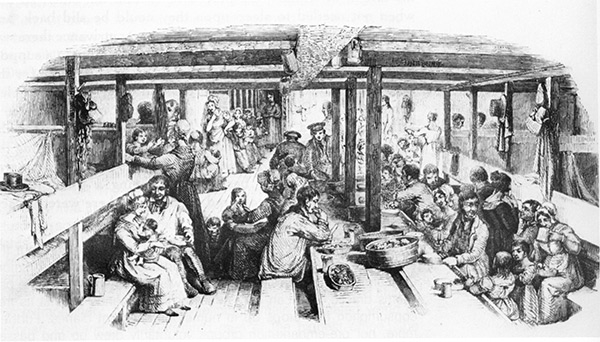
Thur: Dec 12, 1850: A fine morning and all rose
early. The knowledge that land was near was sufficient to arouse the most
inveterate sluggard on board. Land was again in sight and hearts beat high
in the expectation of going ashore soon. It was foreign looking scene,
different from our home scenery. There is a strange hill with a flag on
top which is called the Lion's Hump, Head or Rump and the flag is used by
the signal station to tell the town of our arrival. We have a hasty dinner
as we are all anxious for a nearer view of the Cape of the hopeful name.
The wind rose and blew very hard. Our ship dropped anchor at 2, lying in
Cable Bay. Some of the passengers go ashore find that 9 out of 10 people
are black and like the place very much but others prefer to wait till the
next day to go ashore as the wind blew still harder, until it became a
raging gale - all on board expected to be blown out to sea. Some
excitement was occasioned by the efforts of a small boat which was tossing
about on the foaming billows, at the mercy of wind and wave, striving in
vain to make the shore. At last it was obliged to fetch to the Castle
Eden, and the two sailors, with their passengers got safely aboard.
Another small boat was not so fortunate and is blown adrift. The wind is
from the south-east and the scene of the capital of the colony is most
wonderful. It is situated in a most beautiful spot at the base of Table
Mountain, which towers above to the height of 3,500 ft. The mountain is
both magnificent and peculiar; it is flat at the summit - hence its name -
it reminds one of a huge ruined fort. Immense fleecy clouds began to roll
forward and descend far down the sides of the mountain and hang like a
dense shroud over the town and apparently this cloud always makes its
appearance when the south-east wind blows and from it's appearance and
whiteness, is called the "Tablecloth." The bay is now in an awful state,
the waves lashing themselves into foam under the fierce fury of the wind.
The scene is so awe-inspiring in its grandeur we cannot feel impressed by
the peril of our position. Ships are in a dangerous situation. Well earned
is the sobriquet cabo tormentoso, bestowed by navigators in days gone by.
Its storms call forth the name from those who were forced to undergo the
unpleasant experience. Rough was the storm and mountains high rose the
rocking billows, when night closed in; few on board were so heedless of
their peril as to allow Morpheus to enfold them unconscious in his strong
arms throughout the lonely midnight hours.
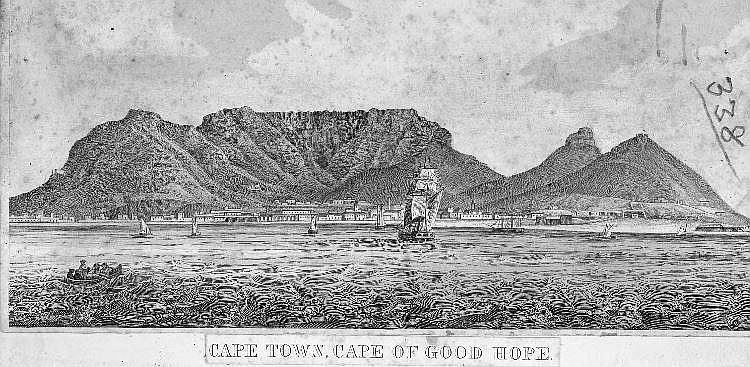
Fri: Dec 13, 1850: The day has dawned clear and
bright in Table Bay and all signs of the gale have disappeared. All who
have remained on board decide to go ashore as soon as possible. While
lounging on the deck we were interested in the movements of a bumboat
manned by natives, which soon pulled alongside and offered fruit and
vegetables for sale. Gladly we bought fruit which consisted of oranges,
lemons, pears, apricots and Cape plums. The boat was loaded with other
things, all of which were sold to the ship. Bread, tortoises, cucumbers
and all types of vegetables which were much appreciated by all as we have
long been weary of our beef and biscuit fare. Never was fruit more welcome
and vegetables more sought after. The ladies considered the natives
horribly ugly and even the gentlemen were forced to admit that they were
not handsome or prepossessing in appearance, and that their jargo was
un-musical as well as unintelligible to English ears. Ashore the town is
astonishing - well laid out and the streets well made and wide. Many have
a stream of clear water running through them and are planted on each side
with trees. The houses are all flat-roofed but are large and commodious
and are chiefly built either of red granite or brick. The appearance of
the town is neat and comfortable; there are some fine squares and lovely
gardens. Splendid and elegant buildings meet the eye on every side. There
are several churches and other fine public buildings. A stroll through the
town was followed by a walk through the Government or Botanic Gardens
where the Governor - Sir Harry Smith - resides. It is a very pictuesque
place with some beautiful rose borders. The sun's heat is scorching and
our skin begins to burn as we continued our walk. The new Roman Catholic
church which is in the course of erection is the next attraction before
having dinner. Several Europeans are seen about town - all men - who are
obliged to wear veils, on account of the dust which is a nuisance and the
heat. No white ladies are seen abroad in the daytime - they don't go out
all except in the evenings.
 Letters written by
Surgeon-Superintendent Dr Haylock to the Canterbury Association pointing
out they had been deceived in the quality of the provisions for all
classes of passengers, that steerage passengers
were experiencing suffering due to the confined
accommodation of their berths, problems with the water closet
siting and a mutinous ship's crew. Letters written by
Surgeon-Superintendent Dr Haylock to the Canterbury Association pointing
out they had been deceived in the quality of the provisions for all
classes of passengers, that steerage passengers
were experiencing suffering due to the confined
accommodation of their berths, problems with the water closet
siting and a mutinous ship's crew.
|
Dec 14, 1850: Saturday: Still in Table
Bay. The excessive heat has forced us to admit that on no account would we
live at Cape Town, beautiful place though it is. A magnificent view of the
bay and surroundings was obtained from the summit of Table mountain.
Devotees of the fragrant weed were laying in a stock of tobacco and
cigars, which were very cheap. Havannahs were sold two for a penny.
Manillas a penny each were excellent and a stick of Cavendish tobacco was
procurable at the same price. After sleeping on board the Castle Eden some
passengers wishing to go ashore were seated in a boat in readiness to
start when a great row commenced on deck. Two sailors wanted to go ashore
but the second mate would not allow them. Just as the boat was putting
off, the two men slid down the mast into the boat and would not move out
again. The second mate, determined that they would not outwit him, at once
made the mast fast to the ship. This act caused a terrible row; not a man
would help the second mate, and the boat thus lashed to our ship was
violently knocked about by the sea against the sides of the vessel, and
almost broken to pieces. The passengers could not get out of the boat and
at last the sailors in the ship let go the rope that held the boat fast to
the Castle Eden. The passengers wanted to get back on board but the
sailors would not let them do as they wished - "We will put you overboard
sooner than go back" they said fiercely as they took possession of the
helm, so the two unwilling passengers were forced to go ashore with them.
When the captain was informed of the affair, he had the three sailors
arrested and taken in custody for mutiny. The first mate was tried and
sentenced to pay a fine of �5 or undergo two month's imprisonment.
Dec 15, 1850: Sunday: Still in Table Bay. The
majority of the ship's company went en masse to hear Bishop Jackson preach
in St George's Church. A brig came into the Bay with immigrants from
London, 120 days on the passage and four days without provisions and
water.
Mon: Dec 16, 1850: Still in Table Bay. The second
mate Calvert and some of the men belonging to the Castle Eden struck and
were arrested for refusing to do their work. Each got thirty days
"nut-cracking" Fortunately the Lady Nugent was in port. She had just
arrived at the Cape from New Zealand (having taken Mr Robert Godley
thither). The third mate (Mr. Heyward) of the Lady Nugent was promoted and
took the position ofd second mate on the Castle Eden. This change and the
trial settled the mutiny, and the rowdy sailors received their just
punishment and the passengers were able to return to the ship. 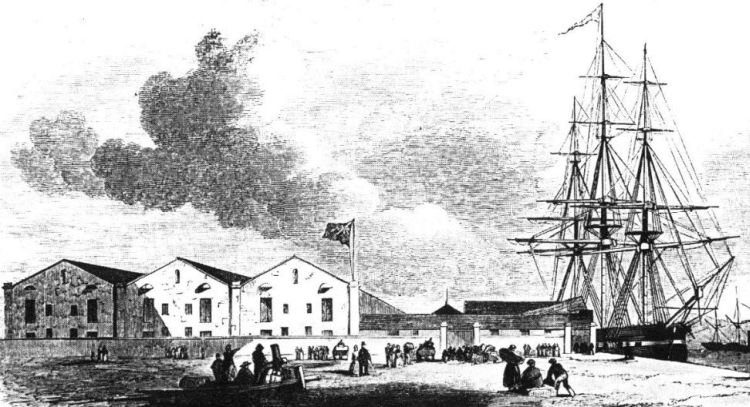
Tue: Dec 17, 1850: At noon, the ship is in a state
of great confusion. Several policemen came on board and took away the rest
of the men who refused to work, and a few new sailors came to take their places.
Wed: Dec 18, 1850: Day of intended departure - shipping new hands (these were men imprisoned at the Cape from other passing ships!)
Thu: Dec 19, 1850: Provisions on board (except fresh meat) Ready for sea but some of the old hands had thrown the windlass handle overboard delaying departure until a new handle replacedment is found.
Fri: Dec 20, 1850: Waiting for a new handle. We
have had fresh provisions all the time we have been here.
Sat: Dec 21, 1850: Again the good ship Castle Eden
makes preparations for departure and we weighed anchor at 12 noon and glad
to resume our voyage, we again set sail, taking a south-east course. Two
passengers are left behind (Henry and George Beechey). We watched the land which disappeared so
quickly from view and waved farewell to Cape Town, whose open markets
under the spreading boughs of some trees and watered streets had been so
interesting. Farewell to the wondrous Table Mountain, whose rocky sides
were overgrown by gorgeous flowering masses of wild geraniums and to the
curious "Lion's Hump", a mount which in shape resembles a lion resting
with its head raised as though watching something. We prepare to run along
the line of 40 degrees south latitude as closely as the wind will permit.
A rough sea, mountains high, caused general suffering from mal-de-mer.
After dinner. the seas became even rougher and all passengers are
continually knocked about. Boxes and other articles had got loose and were
rolling about in chaotic confusion.
Sun: Dec 22, 1850: Divine service and everything
else was conducted with difficulty, through the heaving and rolling
motions of the ship. Going 12 knots. Mr. Davidson and Miss Godfrey asked
in Church and the banns of marriage published - one proclaimed for the
first time and the other for the second time. Cupid had indeed been active
and now Hymen was about to complete his work.
Mon: Dec 23, 1850: A fine day - rough, warm and
windy. A ship in sight but she would not answer us.
Tue: Dec 24, 1850: A fine breeze - weather much
the same. Time is spent stoning raisins for the Christmas pudding. In the
evening there was great jollification - it was Christmas Eve at last - a
memorable evening at sea and time to reflect on the last Christmas Eve
spent by a fireside at home, while the log blazed and crackled merrily in
the hearth; merry voices had echoed through the house, there had been
music of the dancing feet of youth while aged and dear faces had smiled
approvingly. Now all was changed - in old England sweet Christmas carols
were being sung, amid the glistening snow and under the festoons of holly
and mistletoe. The pilgrims who had set out in the first three ships were
spending Christmas in their new home and in a warmer clime, while the
Southern Cross shone brightly overhead. The Cressy was still at sea and
our Castle Eden is still traversing mid-ocean. The weather may be too warm
and rough, but what matters the warring of elements to those on our ship,
for universal good-humour and merriment prevails. It is Christmas Eve - a
season of joy and goodwill. We pilgrims are enjoying ourselves in various
ways. There is no hanging of holly or mistletoe, no snow covered
landscape, but all around, the restless heaving and tossing blue ocean,
flecked with foam. How like, yet totally different is the scene to any
that we voyagers are familiar with - In England the same joyous merriment
prevails, the same carols are being sung, the same music and dances are in
full swing. We who have left behind friends are thinking of those familiar
faces and sigh as we think - "I wonder if they miss me at home?" Yet, we
know, in that far distant home, the thought is uppermost, while the eye
rests not upon some well-known figure, "I wonder where he (or she) is, and
what is he doing now; does he think of us at home?" The hour is late when
our merriment ceases and the bishop solemnly offers up prayers suitable to
the occasion which his little flock join in devoutly.
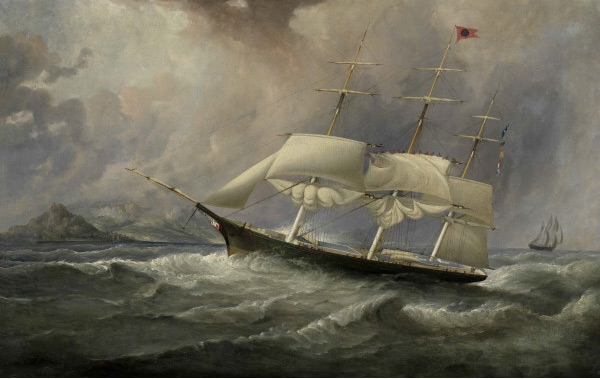
Wed: Dec 25, 1850: The weather is all it should be
- calm and clear. A short distance away are some sperm whales. These
monsters of the deep were disporting themselves in the morning sunshine
while we passengers on the ship, indulged in games and sports also. Nearly
the whole day was thus spent. Of course there was a huge joint of roast
beef for the first class, Christmas pudding and sparkling champagne and
many other delicacies graced the festive board; the steerage passengers
dined on roast mutton and Plum pudding. This Christmas at sea will never
be forgotten. A child is christened.
Thur: Dec 26, 1850: A steady breeze and very rough -
going 8 knots. Hardly any breakfast could be got only cold meat and bread.
All sails are taken down as the gale increases in fury - many retire to
their beds but not to sleep.
Fri: Dec 27, 1850: Very rough - going 9 knots -
the wind raged fiercely, upsetting everything in the ship. We remained
battened down.
At midday, the main meal, was cooked in a common
pot. Each mess had a numbered wooden or metal token attached
for identification to its particular lump of meat and also to
its net of preserved potatoes a plum duff a boiled rice which was
pudding. The evening meal consisted of biscuit and butter with tea
to drink and since there was seldom any shortage at the midday meal,
there were cold leftover meats for tea. The meals were monotonous -
porridge every morning, 2 days they had salt beef and boiled rice
and 3 days pork and pea soup, and 2 days of preserved meat and
preserved potatoes The most common complaint concerned bread - it
was either stale or when freshly baked on board, sour and of poor
quality. The rough seas had everything on the table sliding and
caused unexpected variations to the menu when the weekly provisions
would get all mixed together, such as salt, tea, coffee and treacle!
The second cabin was treated in the same way as the steerage but the
fortunate inhabitants of the first class cabin had a good deal of
fresh food shipped to them at the beginning of the voyage and had
often a milch cow. They had the luxury of their meals cooked by a
steward. The narrow decks were cumbered with a pen of squealing
pigs and sheep and an array of poultry hutches.Occasionally this
livestock was killed and consumed on board and supplemented by a
pedigree lamb or bull or one or two valuable dogs which passengers
were bringing out for use on their farms.
|
Sun: Dec 29, 1850: A trifle more calm than
yesterday and a good breakfast was greatly appreciated by we tempest
tossed voyagers. Divine services were held as usual and another couple
asked in church so two marriages were proclaimed. In the evening, of most
interest to our ladies, Mrs Rowley's infant was christened. The tiny
morsel of humanity was enfolded in the strong arms of the church and
unconscious of its strange surroundings, was afterwards petted and admired
by all mothers and many of the younger ladies present.
Mon: Dec 30, 1850: Still blowing a gale. The wind
is dead against the ship for ten hours. Up till this time since we left
the Cape, the winds had been favourable, always SE by E. The weather too,
was bitterly cold.
Tue: Dec 31, 1850: A strong breeze - the weather
has become warm with the wind change and our ship once again speeds
swiftly onward over the trackless waves. A ship is in sight. In the
afternoon the deck presented an animated appearance; sports and games of
various kinds were indulged in for this was the last day of the old year.
New Year's Eve was spent pleasantly and as another year passed away, many
looked back on last New Year's day, and then thought of the present time -
the opening of a new epoch in their life's history. The past year had
brought much sorrow and many regrets to some, but not unmixed with gleams
of happiness, while others had nothing but regret, and hoped that the
coming year would prove as peaceful to them as the past. All of us had
taken a strange and eventful path. What would the coming year bring forth?
Who could answer? The ship, however, should keep up old customs, and the
Old Year was "seen Out" amid the joyful and warm wishes for a "Happy New
Year."
Wed: Jan 1, 1851: New Year's Day - the year opened
full of promise as far as the weather was concerned. The day was
beautifully fine and fresh. There was a hind quarter of mutton for dinner.
We had now reached longitude 56 degrees east of Greenwich.
Thur: Jan 2, 1851: Wind against us and squally. .
Fri : Jan 3, 1851: Wind fair - ship going 8 knots.
There were days with a fair wind when spirits were high and
the Castle Eden vessel moved along at a good pace of fourteen
knots but others when the wind came from the wrong direction
allowing the ship to travel at less than one knot an hour and so
make very little progress by the end of the day. The passage would
seem at times like this to be going to take for ever. On a fine
day the passengers were delighted by the porpoises turning over
and over close to the side of the ship and when the sea was like
glass, so smooth and clear the passengers would fish over the side
in the hope of some fresh food.
As the voyage progressed there would have been storms such as
people from the land never visualised happening. The wind raged to
a fearful height and whistled through the rigging as the ship
rocked like a cork and raced up and down the troughs of the ocean
at speeds of over fourteen knots. The crew of men and boys would
have battled with the sails which would have been filled like a
bow ready to burst with the pressure and cracked with enough force
to split them. On occasions the wind would have been so strong
that one sailor would have been unable to manage the wheel by
himself and had to have help. Many must have feared for their
lives and wished that they had never set out on this voyage. At
times the ship would have given a mighty heave, the waves rising
very high and falling on deck with a heavy thud and all on board
must have thought that their vessel was going over onto her side.
The women would have screamed and the children must have been very
frightened. At times like this it would be nearly completely dark
as the hatches would be closed and sealed with an oil cover put on
them to keep the sea out. Despite this, water would find its way
through all the caulking and had to be continuously mopped up to
stop all their belongings becoming wet and above, the rain could
be heard falling heavily on the deck. Imagine the galley where the
tea for all passengers ended up on the deck, mixed together and
running out of the cook house across the open deck and down into
the sea. Down below all their possessions would have been on the
floor, flung from their places on the shelves. One account
recorded that the floor was like a �general shop� containing all
sorts of things, with their water bottles emptied and some slop
pails that were tired of carrying their burden emptying themselves amongst the debris. |
Sat: Jan 4, 1851: A strong gale and battened down.
The past three days have been wet, cold and miserable. 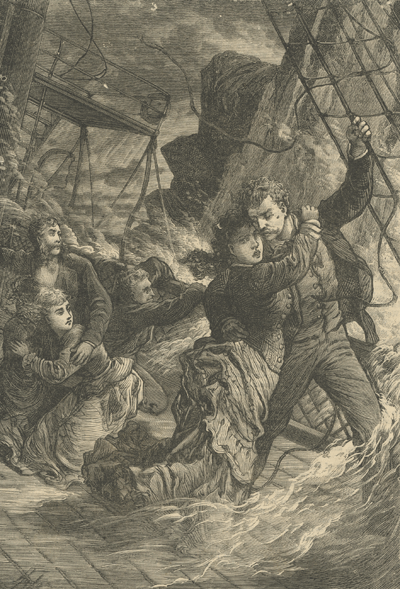
Sun: Jan 5, 1851: We experienced a terrible
thunderstorm during last night - vivid flashes of lightening lit up the
seething and warring waters, and deafening crashes from "Heaven's
artillery" followed. But as Dibdin says - "There's a sweet little cherub
that sits up aloft," which saying is held in great respect by many of the
sailors. Providence has not destined us to a watery grave; the Castle Eden
ploughed her way gallantly through the tempest-riven ocean - in total
darkness and again lighted on her way by the blazing lightening which
zigzagged and flashed across the murky sky. It was a weird and awful
scene, holding one spellbound in awe and wonder. How small is man in the
hands of the Almighty! how insignificant, and how helpless in Nature's
convulsive fits of rage! When everything if fine and the sun shines
brightly, man oft in his pride is apt to imagine himself supreme. A storm
at sea, on land, or an earthquake, humbles the haughty head, and the
strongest tremble before the manifestations of the unseen power. Today
during Divine Service a third marriage is announced. In the evening at 10 pm a
child in steerage died.
Mon: Jan 6, 1851: Another child died at 4 am.
After prayers, Miss Muriel Thurling and Mr. William Roumsley married at 11 am. They were steerage passengers and belonged to "the parish of the Castle Eden" and after the wedding all shared in piece of the "bridecake" with the compliments of the newly-wedded pair. Joy and sorrow often travel hand in
hand together and at 4 p.m. in the afternoon, the two children were buried - one, Jane Lewis aged 2 years and the other, Sarah Beckingham was 13
months and this had a saddening effect on the spirits of the bridal party.
In the evening, the chief-cabin passengers celebrated the Twelfth Night, a
party given by the honourable ladies - an successful and pleasant evening.
Very few ships got to their destination without
friction of some sort. Conditions of close confinement on board,
made the task of the surgeon and the immigrant constable whom he had
chosen to help aid him in keeping the peace among the people on
board, very difficult. When we consider the conditions of the voyage
- the enforced idleness and at time, the doubtful end, it speaks
well for the selection of passengers consciously imposed on itself
by the Association, that there was so little trouble on board. Dr
Johnston once remarked. that being at sea was like being in prison
with the added chance of being drowned and it is hardly surprising
that an occasional immigrant who somehow found liquor should have
drunk himself stupid. Some who found shipboard
discipline stifling, the voyage became a series of attempts to
subvert it. Petty bickering and quarrels were frequent so the
respite with the Cape Town visit must have temporarily relieved a
lot of tension. Apart from the skilled medical men who were going
out with the intention of settling, most who served as surgeons were
either in their first job or unable to find work elsewhere. Their
pay was low and a return voyage was not always guarranteed. Despite
the good deal of sickness on board, the Castle Eden lost only 3
lives - about the mortality in the general population at that time.
But it was in these times of illness or death that spirits were at
their lowest ebb when a loved one was committed to the vaste
loneliness of the ocean. A more difficult task for the Surgeon was
to prevent immigrants nourishing grievances against each other or
the authorities. A complex set of relationships existed between
emigrants which was to continue long after they got to their
destination.
|
Tue: Jan 7, 1851: Fair wind - going 10 knots.
Wintry weather prevails and the outlook is cheerless in the extreme. Some
little diversion is created by the unruly conduct of the under-steward.
The captain, with promptitude, settled the matter by administering a
thrashing, and Henry will behave better in the future.
Wed: Jan 8, 1851: Light breeze - Mr Freestone
caught four albatrosses and Mr Mason one, A beak of one measured seven
inches in length. Our ship passed St Paul's by about 100 miles south.
Thur: Jan 9, 1851: Fair winds enable us to get
along very fast at 9 knots. Another wedding takes place and Mr. Thomas Davison
is the happy bridegroom on this occasion when he married Miss Ellen Godfrey.
Fri: Jan 10, 1851: Going 10 knots - wind fair all
day.
Sat: Jan 11, 1851: Going ten knots. It is
estimated that our rate of sailing is about 200 miles a day.
Sun: Jan 12, 1851: Going 9 knots. A heavy
hailstorm passes over and the weather has become colder again.
Mon: Jan 13, 1851: Going 8 knots. The ship is now
in longitude 101 degrees east still keeping near the 40th degree of south
latitude.
Tue: Jan 14, 1851: Going 7 knots.
Wed: Jan 15, 1851: Going 8 knots and we are now
350 miles from New Holland. (Australia) These past three days, our speed
of sailing has slackened and become slow. A piece of seaweed floated past
and attracted much attention. A favourite pastime of some of the men is
netting. All the birds now have disappeared, not a solitary gull can be
seen and the ship's little feathered companions are greatly missed.
Thur: Jan 16, 1851: 7 knots. Today, our ship is
off Australia - a source of much satisfaction. The first mate, Mr Reid,
fell from the maintop, and three or four sailors fell on top of him. Mr
Reid received a severe shaking, and his leg was so badly hurt as to render
him unfit for duty. A child, a girl, is born at 7 p.m. to Hannah Johnson,
one of the steerage passengers who hailed from Biggate.
Fri: Jan 17,1851: Going 9 knots. Evening parties
continue to be fashionable - each one more jolly than the last. People
speculate how much longer we will be able to enjoy the good stories and
songs on board our staunch old ship, which is a home to us all.
Sat: Jan 18, 1851: Going ten knots. January 19,
1851: Sunday : Calm in the morning and with the wind fall, the cold
weather sets in. A light breeze in the afternoon.
Mon: Jan 20, 1851: Going 8 knots. A birthday is
the cause of celebration with Plum pudding and cakes for tea.
|
A complaint often made by immigrants was that they
had been told that they need bring nothing on board with them and
afterwards wished they had shipped extra food and comforts. They did
not starve without food of their own but any food not the ship's,
was an exciting interruption to the monotony of their diet. The
Association, had with forethought, even supplied clothing to some
people, but they let them get along with only one plate each. The
immigrants took two outer suits and a dozen changes of underclothes
and socks aboard. They had to have a month's supply in a bag kept in
their berths -the rest of their property was stored down in the
hold. When they got at it, once in every three or four weeks, they
usually took the opportunity to bring up all sorts of odds and ends,
and the deck would resemble a bazaar and amuse themselves driving
bargains with their fellow passengers. One Scot shopkeeper
successfully disposed of whiskey, dried herrings and religious
tracts. There was also dismay when people found their trunks
battered and their clothes damp, mildewed, infested with cockroaches
or run through with jam or pickles which had spilled and sometimes
theft was a problem.
Washing the clothes during the voyage was
very laborious but at sea, with its absence of dust and smoke and
because the decks were regularly cleaned, they did not get as dirty
as on land. When a wash day was necessary, a row of tubs and barrels
was lined along the ship's side and salt water was heated in
coppers. Husbands assisted wives in the tasks of rubbing with marine
soap and the wringing. The clothes were then hung to a rope
overhead. After a rain, fresh water could be had -and there was a
rush to take advantage of it. You had to guard against an unexpected
ship lurch which could send women, tub, water and clothes flying.
|
Tue: Jan 21, 1851: Going 8 knots. After morning
prayers, Mr Francis McArdle and Miss Sarah Collins marry - this is the
third marriage on our ship. We are now in the longitude of Hobart Town and
have run several degrees of latitude to the south.
Wed: Jan 22, 1851: Going 9 knots. Cold, rainy
weather continues.
Thur: Jan 23, 1851: Going 9 knots.
Fri: Jan 24, 1851: Squally and a heavy gale.
Sat: Jan 25, 1851: A fine breeze - a complete
weather change has taken place and it becomes quite warm. A child, a boy
is born to Fanny Wheeler of the steerage - a curious fact, worth noticing,
is that during the voyage there have been 3 deaths, 3 births and 3
marriages. The Castle Eden will arrive with her full complement of
passengers. Mr Reid now resumes his duties, having almost recovered from
the effects of his late fall from the maintop. A large comet is visible
every evening. The warmer weather seems to have brought back all the sea
birds, which have appeared in great numbers, the sea being literally
covered with them. Cape-pigeons are more numerous here than anywhere else.
One is caught.
Sun: Jan 26, 1851: A fair breeze and four months
today since we hauled out of dock.
Mon: January 27, 1851: Going 8 knots - saw some
whales.
Tue: Jan 28, 1851: Calm - a ship in sight - got
the anchor up.
Wed: Jan 29, 1851: Light breeze - Mrs Johnston had
her little daughter christened, the name being Hannah. . Our ship is now
reckoned to be off Stewart Island.
Thur: January 30, 1851: Light breeze - saw some
black fish and some whales.
Fri: Jan 31, 1851: A strong westerly gale is
blowing; our ship had to tack back NW then SE so it has driven us back two
degrees. Now a thick fog has fallen and nothing can be seen thirty yards
from the vessel. All the ordinary sails are taken down, and the short
sails are put up in their place.
Sat: Feb 1, 1851: The wind has greatly fallen and
things have become more comfortable. We are approximately 450 miles from
Port Cooper (Lyttelton) with a tolerably favourable run round the southward of Stewart Island. A great number of our sailors are Scotsmen. One
is named Littlejohn (nephew of an Edinburgh confectioner) and is a very
good singer and another sailor named Heive are greatly in demand for their
songs and concertina playing. These two sailors are not returning with the
ship to England as they had started with the intention of staying in
Canterbury.
Sun: Feb 2, 1851: Our Divine service starts an
hour earlier than usual, because we all are expecting to see for the first
time the distant outline of our adopted land and the Bishop, in
consideration of the general feeling of expectancy - which without a doubt
he shares, cut the sermon short. We are disappointed as it is invisible.
We pass the Snares, a group of dangerous rocks near the
southern extremity of Stewart's (sic) Island. A strong breeze and a heavy
swell on the sea. At twelve o'clock we are about 45 miles distant from
Otago..
Mon: Feb 3, 1851: The day is fine and clear. There
are great quantities of seaweed continually floating by and also a new
type of bird is seen flying about. Bank's Peninsula is sighted at twenty
minutes to one o'clock and excitement rises to fever height. All the sea
around Bank's Peninsula appears to be quite red and we learn that the
curious colouring is given to the waters by the presence of myriads of
small insects.
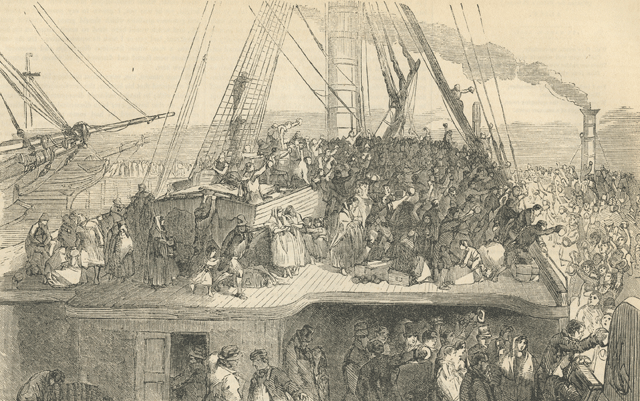
Tue: Feb 4, 1851: After breakfast our Castle Eden
is in sight of land and we anxiously clamber to the front of the
forecastle - some to the maintop to obtain a closer view of the land of
our adoption. The coast is irregular and the Peninsula is almost covered
with trees and it is indeed lovely. The day is beautiful and warm and
birds and fish are in abundance. The wind suddenly goes down and after
furling the sails, we caste anchor between Pigeon and Victoria Bays. Our
Castle Eden is within fifteen miles of her destination. A sail is in
sight, supposed to be a vessel on her way to Otago. Bishop Jackson
goes around with a paper to obtain all passengers signatures and this is
presented to the Captain as a testimonial, thanking him for having brought
us safely to the end of our voyage. We behold in the evening the distant
outline of the picturesque mountains which form the Banks Peninsula. At
last, the end of our interminable and tedious voyage - we are almost
within sight of Lyttleton and we expect the ship will anchor the next
morning in Port Victoria.
Then, as night came on, it was deemed
necessary to stand out to sea and we dropped anchor near Pidgeon Bay.
As their destination was close at hand, passengers are
rejoicing as all are heartily sick of the confinement of
the ship and its continuous motion - to say goodbye to the sea
forever.
With only a few more days to go, there were worries also
that whether their ship would be found healthy enough to be able to
set their passengers at liberty in the new land, or whether they
would be kept in quarantine. As land approaches everybody is busy
with extra cleaning, taking all their bedding out and scrubbing out
the berths. Every nook and cranny is cleaned out and scrubbed under
the watchful eye of the constable whose duty it is to ensure that
the ship is not placed in quarantine on
arrival. Imagine the excitement on board as they
rounded Stewart Island at the south of New Zealand and made their
way up the east coast and finally journey�s end and then, to experience unfavourable winds and add delay to making
that final land fall. Everybody would be down in the dumps as
one day�s sailing became two days and each day thinking today would
be the day they would land after long months at sea. As the mist
cleared on each new day they would be able to see the outline of the
hills very plainly which would have put fresh life into them. As
they finally approached the harbour they would be able to see the
hills and habitations dotted here and there. |
